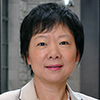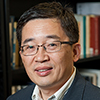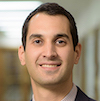Research / Areas of ResearchComputational Engineering
Advancing computational simulation to understand and predict phenomena across the natural and technological world
 Computational simulation gives researchers the power to explore complex engineering problems that cannot be easily approached through theory and experiment alone. We are creating solutions using high-performance computing platforms and advanced algorithms to impact all our cross-cutting research areas.
Computational simulation gives researchers the power to explore complex engineering problems that cannot be easily approached through theory and experiment alone. We are creating solutions using high-performance computing platforms and advanced algorithms to impact all our cross-cutting research areas.
View video about computational engineering
View computational engineering faculty
![]()
Research Area Subtopics

of metal additive manufacturing. (G. Wagner)
Novel Formulations and Algorithms
The ever-increasing capability of high-performance computer hardware, programming languages, and physics models brings opportunities and challenges in improving the fidelity, efficiency, and robustness of simulations. We are developing mathematical and computational tools that leverage these advances to solve complex, multifaceted, multiscale engineering problems.

with source terms. (V. Lefevre)
Multiscale Modeling and Design for Materials and Manufacturing
New fabrication techniques allow unprecedented control of the nano- and micro-structure of materials and the ability to shape those materials into complex parts. Computational modeling gives us the power to understand and optimize the interactions between manufacturing processes, material structures, physical properties, and device performance by linking across multiple spatial and temporal scales.

Acharya; https://commons.wikimedia.org/wiki/File:
Sistema_Digestivo.jpg)
Bio Simulations: Organs, Tissues, Molecules and Devices
Computational simulation deepens our understanding of human and biological systems and their interactions with medical technology. From the mechanics of organ systems and tissues, to the modeling of biomaterial at the molecular and microstructural level, to the design of technologies like drug delivery and wearable electronics, we are harnessing computational models to provide crucial insights and predictive power that enable breakthroughs in medicine and health.

using multiresolution analysis and machine learning. (X.
Xie, J. Bennett, S. Saha, Y. Lu, J. Cao, W. Liu, and Z. Gan)
Mechanistic Machine Learning
The explosive growth of artificial intelligence technology affects every aspect of our lives, including engineering. But to be truly predictive and safely reliable, AI systems must go beyond simple pattern recognition. We are building knowledge-driven models that combine the raw mathematical power of deep learning networks with physical principles and engineering insight.
![]()
ME Faculty
Jian Cao
Associate Vice President for Research
Cardiss Collins Professor of Mechanical Engineering and (by courtesy) Civil and Environmental Engineering, Industrial Engineering and Management Sciences, and Materials Science and Engineering
Director, Northwestern Initiative for Manufacturing Science and Innovation (NIMSI)
Wei Chen
Chair and Professor of Mechanical Engineering
Wilson-Cook Professor in Engineering Design
Professor of Industrial Engineering and Management Sciences and Materials Science and Engineering (by courtesy)
Horacio Espinosa
James N. and Nancy J. Farley Professor in Manufacturing & Entrepreneurship
Director, Theoretical and Applied Mechanics Program
Director of the Institute for Cellular Engineering Technologies
Professor of Mechanical Engineering and (by courtesy) Biomedical Engineering and Civil and Environmental Engineering
Sandip Ghosal
Associate Professor of Mechanical Engineering and (by courtesy) Engineering Sciences and Applied Mathematics
Yonggang Huang
Jan and Marcia Achenbach Professorship in Mechanical Engineering, Civil and Environmental Engineering, and (by courtesy) Materials Science and Engineering
Sinan Keten
Jerome B. Cohen Professor of Engineering
Professor of Mechanical Engineering and Civil and Environmental Engineering and (by courtesy) Biomedical Engineering
Associate Chair of Mechanical Engineering
Sridhar Krishnaswamy
Professor of Mechanical Engineering
Director of Center for Smart Structures and Materials
Wing Liu
Walter P. Murphy Professor of Mechanical Engineering & Civil and Environmental Engineering and (by courtesy) Materials Science and Engineering
Richard Lueptow
Professor of Mechanical Engineering (and by courtesy) Chemical and Biological Engineering
Senior Associate Dean
Neelesh Patankar
Professor of Mechanical Engineering and (by courtesy) Engineering Sciences and Applied Mathematics
Director, NAISE
John Rudnicki
Professor of Civil and Environmental Engineering and Mechanical Engineering
Gregory Wagner
Associate Professor of Mechanical Engineering
Director of Graduate Studies for Mechanical Engineering
Q. Jane Wang
Joseph Cummings Professor in Mechanical Engineering
Executive Director, Center for Surface Engineering and Tribology
Courtesy Faculty
Michael Miksis
Professor of Engineering Sciences and Applied Mathematics and (by courtesy) Mechanical Engineering
Director of MS Studies for Engineering Sciences and Applied Mathematics
Julio Ottino
Walter P. Murphy Professor of Chemical and Biological Engineering and (by courtesy) Mechanical Engineering
Distinguished Robert R. McCormick Institute Professor
Professor of Management and Organizations, Kellogg School of Management

















